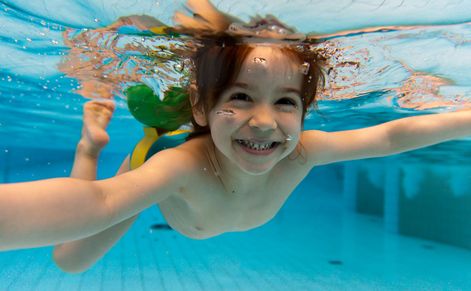On a hot day, there is no more comfort than in the water. It’s cool and fun. Kids love it. Swimming is a good sport.
However, harmful ultraviolet (UV) rays exposed to the sun increase the risk of skin cancer. And those rays will reflect off the surface of the water, sand, and concrete or the surface of the deck. So it is especially important at the beach or in the pool.
The Skin Cancer Foundation offers the following tips to help everyone enjoy the sun while maintaining:
1. Apply a layer of sunscreen.
For outdoor activities, use a waterproof broad-spectrum (UVA/UVB) sunscreen with an SPF of 30 or higher. To avoid leaks, apply sunscreen to your entire body before putting on your swimsuit. Make sure to apply sunscreen every two hours or after swimming or when sweating is excessive to all exposed parts of the skin that are not covered by fabric.
2. Prevent sunscreen application in advance.
Teach children to apply 1 oz. (2 tablespoons, or approximately the size of a golf ball) sunscreen 30 minutes before going out. Remind them that it is easy to cover missing areas, such as the back of the neck and the top of the ears.
3. Cover up.
Look for high UPF (UV protection factor) swim shirts or child and adult rash guards. Then choose swimsuits that cover more skin, such as one-piece suits and trousers. To get the best protection from water, look for woven or knitted dark or brightly colored fabrics for optimal protection. Do not forget the wide-brimmed hat and wraparound UV protection sunglasses. When purchasing UPF products, look for the recommended seal of the Skin Cancer Foundation.
4. Do not burn.
If you have had five or more sunburns, your risk of melanoma will double.
Avoid tanning. There is no safe tan because tanning itself is caused by skin DNA damage. In addition to increasing the risk of skin cancer, tanning can also lead to premature skin aging, including wrinkles, skin and age spots.
5. Remind children to look for shadows.
It is recommended that children play under shaded umbrellas or on the beach to limit UV exposure. When the sun’s rays are less intense, consider going to the beach or the pool earlier or later in the day.
6. Keep newborns away from the sun.
For infant sensitive skin, clothes and shadows are the best, and the skin is particularly vulnerable to sunlight. Sunscreens are used on infants up to 6 months apart from protective caps and clothing. Avoid tanning. There is no safe tan because tanning itself is caused by skin DNA damage. In addition to increasing the risk of skin cancer, tanning can also lead to premature skin aging, including wrinkles, skin and age spots.

